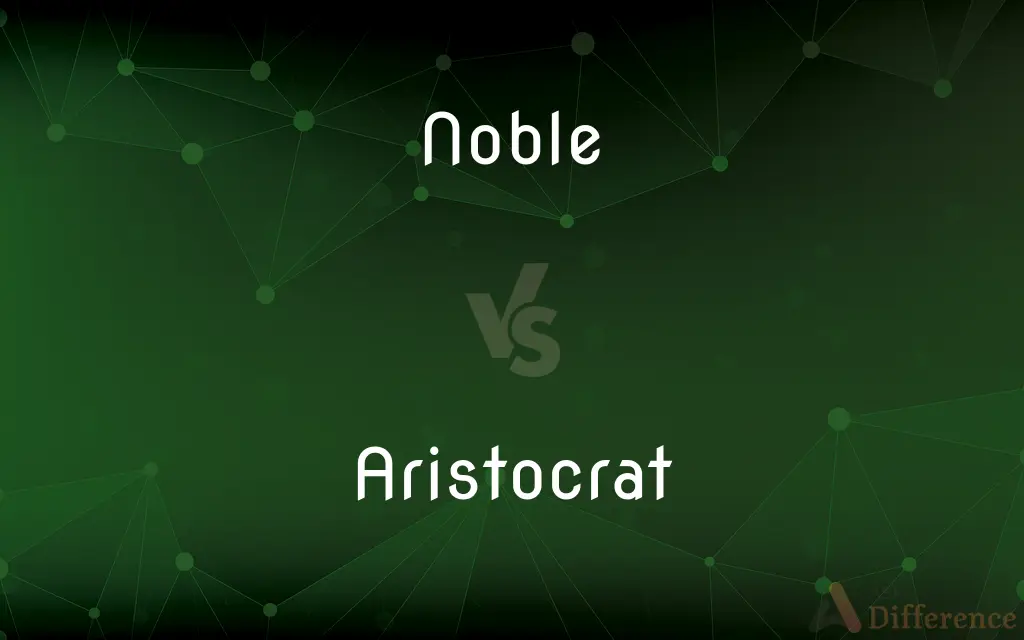Noble vs. Aristocrat — What's the Difference?
Edited by Tayyaba Rehman — By Maham Liaqat — Updated on April 2, 2024
Noble refers to a person of high birth or rank, often hereditary, while aristocrat emphasizes status or class, derived from wealth, lifestyle, or influence.

Difference Between Noble and Aristocrat
Table of Contents
ADVERTISEMENT
Key Differences
Nobility is a social class recognized in many societies, historically conferred by sovereigns as a status of distinction. Nobles often hold titles such as duke, baron, or count, reflecting their rank within the hierarchy. While wealth and land ownership are common, the primary marker is hereditary privilege and titles. On the other hand, aristocrats belong to the highest social class, distinguished not just by birth but also by wealth, education, and influence. Aristocracy can include nobles but extends to those who lead by virtue of their status and resources.
Noble status is typically inherited, passed down from one generation to the next, based on lineage and family ties. This perpetuates a lineage of recognized distinction and honor within a society. Aristocrats, while also often inheriting their position, can sometimes ascend to aristocracy through wealth accumulation, exceptional contributions to society, or by being granted titles for service.
In terms of responsibilities and expectations, nobles are traditionally expected to uphold certain societal, ethical, and moral standards, serving as exemplars in their communities. Aristocrats, due to their broader base of inclusion, might not always be bound by hereditary expectations but are often leaders in societal, cultural, and economic arenas.
The power and influence of nobles often come from their landholdings, historical significance, and recognized titles. Aristocrats, however, wield power through their wealth, social networks, and sometimes political positions, which might not necessarily be tied to a formal title.
While the term "noble" is closely tied to notions of honor, virtue, and lineage, "aristocrat" often carries connotations of privilege, wealth, and an elevated lifestyle. The distinction between these concepts lies in the basis of their status and the source of their influence within society.
ADVERTISEMENT
Comparison Chart
Definition
Refers to individuals of high birth, often with hereditary titles.
Denotes persons of the highest class, including but not limited to nobility.
Basis of Status
Hereditary titles and lineage.
Wealth, lifestyle, education, and sometimes titles.
Key Characteristics
Honor, lineage, historical titles.
Wealth, influence, broader societal leadership.
Source of Influence
Land ownership, historical significance.
Wealth, social networks, political influence.
Expectations
Upholding societal and moral standards.
Leading in cultural, economic, or political realms.
Compare with Definitions
Noble
A person belonging to a hereditary class with high social or political status.
The noble family hosted a gala for the city's philanthropists.
Aristocrat
Someone who has the tastes, manners, etc., characteristic of members of an aristocracy.
Her aristocratic bearing was evident in her impeccable manners.
Noble
Characterized by nobility. having fine personal qualities or high moral principles.
The noble act of saving the child earned him widespread admiration.
Aristocrat
A member of a class of persons holding exceptional rank and privileges, especially the hereditary nobility.
The aristocrat was known for his philanthropic endeavors.
Noble
Historically, a person with a rank of nobility, as knight or baron.
He was made a noble by the queen for his service to the nation.
Aristocrat
Wealthy, influential persons considered as a group.
The city's new museum was funded by local aristocrats.
Noble
Inherently possessing noble qualities or belonging to a noble lineage.
She carried herself with a noble grace that commanded respect.
Aristocrat
Pertaining to or characteristic of aristocracy or aristocrats.
Their estate had an aristocratic elegance unmatched in the region.
Noble
Of excellent or superior quality.
They served the most noble wine at their wedding.
Aristocrat
A person who advocates the rule by an aristocracy.
As an aristocrat, he believed in leadership by the elite.
Noble
Belonging by rank, title, or birth to the aristocracy
The Duchess of Kent and several other noble ladies
The medieval palace was once owned by a noble Florentine family
Aristocrat
A member of a ruling class or of the nobility.
Noble
Having or showing fine personal qualities or high moral principles
The promotion of human rights was a noble aspiration
Aristocrat
A person having the tastes, manners, or other characteristics of the aristocracy
A natural aristocrat who insists on the best accommodations.
Noble
(especially in former times) a person of noble rank or birth
The greater a noble's military power, the more land he could control
The king imposed a tax on both nobles and peasants
Aristocrat
A person who advocates government by an aristocracy.
Noble
A former English gold coin first issued in 1351.
Aristocrat
One considered the best of its kind
The aristocrat of cars.
Noble
Possessing hereditary rank in a political system or social class derived from a feudalistic stage of a country's development.
Aristocrat
One of the aristocracy, nobility, or people of rank in a community; one of a ruling class; a noble (originally in Revolutionary France).
Noble
Having or showing qualities of high moral character, such as courage, generosity, or honor
A noble spirit.
Aristocrat
A proponent of aristocracy; an advocate of aristocratic government.
Noble
Proceeding from or indicative of such a character; showing magnanimity
"What poor an instrument / May do a noble deed!" (Shakespeare).
Aristocrat
One of the aristocracy or people of rank in a community; one of a ruling class; a noble.
Noble
Grand and stately in appearance; majestic
"a mighty Spanish chestnut, bare now of leaves, but in summer a noble tree" (Richard Jeffries).
Aristocrat
One who is overbearing in his temper or habits; a proud or haughty person.
A born aristocrat, bred radical.
Noble
(Chemistry) Inactive or inert.
Aristocrat
One who favors an aristocracy as a form of government, or believes the aristocracy should govern.
His whole family are accused of being aristocrats.
Noble
A member of the nobility.
Aristocrat
A member of the aristocracy
Noble
A gold coin formerly used in England, worth half of a mark.
Noble
(historical) A medieval gold coin of England in the 14th and 15th centuries, usually valued at 6s 8d.
Noble
Having honorable qualities; having moral eminence and freedom from anything petty, mean or dubious in conduct and character.
He made a noble effort.
He is a noble man who would never put his family in jeopardy.
Noble
Grand; stately; magnificent; splendid.
A noble edifice
Noble
Both isohedral and isogonal.
Noble
Possessing eminence, elevation, dignity, etc.; above whatever is low, mean, degrading, or dishonorable; magnanimous; as, a noble nature or action; a noble heart.
Statues, with winding ivy crowned, belongTo nobler poets for a nobler song.
Noble
Grand; stately; magnificent; splendid; as, a noble edifice.
Noble
A person of rank above a commoner; a nobleman; a peer.
Noble
An English money of account, and, formerly, a gold coin, of the value of 6 s. 8 d. sterling, or about $1.61 (in 1913).
Noble
A European fish; the lyrie.
Noble
To make noble; to ennoble.
Thou nobledest so far forth our nature.
Noble
A titled peer of the realm
Noble
Having high moral qualities;
A noble spirit
A solid citizen
An upstanding man
A worthy successor
Noble
Impressive in appearance;
A baronial mansion
An imposing residence
A noble tree
Severe-looking policemen sat astride noble horses
Stately columns
Noble
Of or belonging to or constituting the hereditary aristocracy especially as derived from feudal times;
Of noble birth
Noble
Having or showing or indicative of high or elevated character;
A noble spirit
Noble deeds
Noble
Inert especially toward oxygen;
A noble gas such as helium or neon
Noble metals include gold and silver and platinum
Common Curiosities
What are the typical responsibilities of a noble?
Nobles are expected to uphold societal, ethical, and moral standards, serving as role models in their communities.
What makes someone an aristocrat?
Beyond noble lineage, aristocrats are characterized by their wealth, influence, education, and sometimes the privilege of titles.
Can nobles be aristocrats?
Yes, nobles can be considered aristocrats if they hold significant wealth, influence, or social standing beyond their title.
What are the key characteristics of an aristocrat?
Aristocrats are known for their wealth, influence, social leadership, and sometimes, a refined lifestyle.
Can someone become an aristocrat without noble lineage?
Yes, individuals can ascend to aristocracy through wealth, significant societal contributions, or by being granted titles.
How does an aristocrat differ from a noble?
While nobles are specifically defined by birth and title, aristocrats include those of the highest social class, often marked by wealth, influence, or lifestyle.
Do all nobles have land and wealth?
While historically common, not all nobles today possess land and wealth, though their titles remain.
Is aristocracy always hereditary?
While aristocracy often includes hereditary nobility, it can also be achieved through wealth, influence, or contribution to society.
What defines a noble?
A noble is defined by their hereditary title and lineage, signifying a high social or political status.
How do nobles acquire their status?
Nobles typically inherit their status through family lineage and hereditary titles.
What is the role of aristocrats in modern society?
Aristocrats often lead in cultural, economic, and political realms, using their wealth and influence to impact society.
Can the title of a noble be revoked?
In historical contexts, titles could be revoked by sovereigns, though it's less common today.
What is the historical significance of nobility?
Nobility has been a foundational element of social and political structures in many societies, with titles often granted by sovereigns.
How does the public perceive nobles and aristocrats?
Public perception varies, but both are often viewed with a mix of admiration and critique for their privileges and roles.
Are there any countries that still recognize nobility and aristocracy?
Several countries, particularly in Europe, continue to recognize nobility and aristocracy, though their roles and influence may vary.
Share Your Discovery

Previous Comparison
Think vs. Thought
Next Comparison
Program vs. PlanAuthor Spotlight
Written by
Maham LiaqatEdited by
Tayyaba RehmanTayyaba Rehman is a distinguished writer, currently serving as a primary contributor to askdifference.com. As a researcher in semantics and etymology, Tayyaba's passion for the complexity of languages and their distinctions has found a perfect home on the platform. Tayyaba delves into the intricacies of language, distinguishing between commonly confused words and phrases, thereby providing clarity for readers worldwide.














































